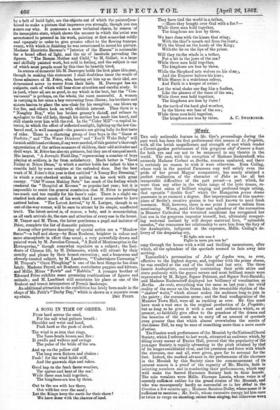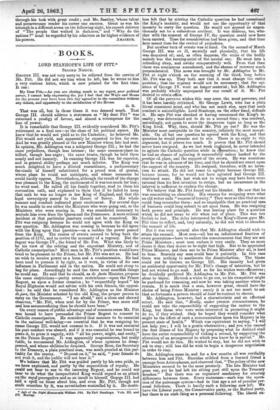Veit.
This only noticeable feature in Mr. Gye's proceedings during the past week has been the first performance this season of Le Prophae, with, all the lavish magnificence and strength of cast which render a Covent-garden performance of this gorgeous chef d'oeuvre a feast for both eye and ear not to be surpassed in any theatre in the world. The cast, with the exception of Madame Rudersdorff, who succeeds Madame Corbari as Bertha, remains unaltered, and there is certainly no reason to wish it were otherwise. Rosa Csillag, whose rank in the musical Parnassus may well satisfy even the pride of her proud Magyar compatriots, has nearly attained a perfect realization of the character of Tides as the all but insuperable difficulties of the part permit—a part which, far more than any other in the whole range of the lyric drama, re- quires that union of brilliant singing and profound tragic acting, that operatic "double first" which the Hungarian prima donna possesses in so eminent a degree. Her impersonation of this master- piece of Scribe's creative genius is too well knowir to need fresh comment. Still, however, there is one point I cannot refrain from mentioning. When, amid the blaze and splendour of the coronation in Munster Cathedral the wretched mendicant has recognized her lost son in the gorgeous impostor himself, but, ultimately conquer-
ing maternal instinct by still deeper maternal love, splendide mender,' she renounces her relationship to save him from the fury of the Anabaptists, indignant at the exposure, Mdlle. Csillag's de- livery of the despairing cry,
"El fig%) mio non 4
FIglio in terra pin non ho"
rang through the house with a wild and thrilling earnestness, after which, all the splendour of the spectacle seemed to fade away into nothing. Tamberlick's personation of Alai of Leyden was, as ever, effective to the highest degree, and, together with the prima donna, he was recalled at the end of the third and last acts. The three fanatic Anabaptists, constantly contrasting their sable attire and stern psalmody with the gayest scenes and most brilliant music were represented by M. Zelger, Signor Polonini, and Signor Neri-Baraldi; and Madame Rudersdorff displayed her brilliancy of vocalization as Bertha. Au rate, everything was the same as last year; the vivid reality of the scene on the frozen lake, the irresistible rhythm of the "skaters' waltz," which almost makes the audience long to join in the gaiety ; the coronation scene; and the final conflagration of the Munster Town Hall, were all as exciting as ever. Mr. Gye must have sunk a vast sum in the original production of Le Prophite; but as long as he gives it with a cast and orchestra which, as at present, so faithfully give effect to the grandeur of the drama and the beauties of the music as to carry off an amount of spectacle even greater than that which almost overwhelms the merits of Guillaume Tell, he may be sure of something more than a mere mixes' d'estime.
ThePassion week performance of the Messiah by theNationalChoral Society, which I referred to last week, attracted an audience which, by filling every corner of Exeter Hall, proved that the popularity of the younger Society is rapidly advancing to the pitch attained by that of its longer-established rival, and the precision and force with which the choruses, one and all, were given, goes far to account for the fact. Indeed, the marked advance in the performance of the choruses in the Messiah by this Society since the commencement of its present season is a proof of the capacity of Mr. Martin both in selecting members and in conducting their performances, which may well make the Sacred Harmonic Society look to their laurels. The solo vocalists were Mdlle. Florence Lancia, whose voice is of scarcely sufficient calibre for the grand strains of the Messiah, and who was consequently hardly so successful as in her debut in the Creation a few months ago ; Madame Saintou-Dolby, whose name it is sufficient to mention ; Mr. Swift, whose excessive energy led him once or twice to verge on shouting, rather than singing, but otherwise went
through his task with great credit ; and Mr. Bentley, 'whose talent and perseverance render his career one success. Great as was his triumph in a different arena on the following night, his superb delivery of "The people that walked in darkness," and "Why do the nations ?" must be regarded by his admirers as far higher evidence of































 Previous page
Previous page